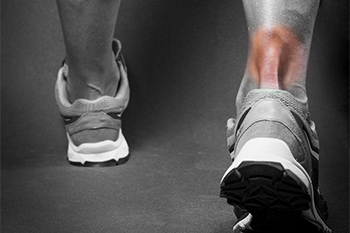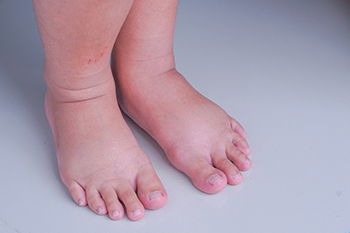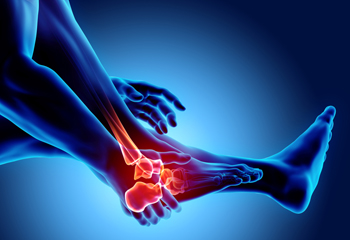Connect With Us
Blog
Items filtered by date: July 2022
An Achilles Tendon Injury May Be More Common Among Men

The medical term for the part of the foot that is known as the Achilles tendon is referred to as the calcaneal tendon. It is located in the back of the calf, and connects the heel to the calf muscles. It is considered to be the largest tendon in the body, and is responsible for pointing and flexing the foot. A foot mishap may result in an Achilles tendon injury, and this often causes severe pain and discomfort. This tendon could partially tear, and in the worse case scenario, may completely rupture. It can happen to people who enjoy the sport of running, and increasing the mileage and speed too soon may result in this type of injury. It is common among men who choose to participate in certain sporting activities during time off from work, and their bodies may not be used to twisting and turning, and the Achilles tendon may become injured. The symptoms that are generally associated with this condition include swelling, the inability to stand, and there may be a popping noise at the time of the injury. For a ruptured Achilles tendon, surgery may be necessary to repair the foot so daily activities can resume. If you have injured your Achilles tendon, please consult with a podiatrist who can guide you toward the best treatment options for you.
Achilles tendon injuries need immediate attention to avoid future complications. If you have any concerns, contact one of our podiatrists of Bergen Foot & Ankle. Our doctors can provide the care you need to keep you pain-free and on your feet.
What Is the Achilles Tendon?
The Achilles tendon is a tendon that connects the lower leg muscles and calf to the heel of the foot. It is the strongest tendon in the human body and is essential for making movement possible. Because this tendon is such an integral part of the body, any injuries to it can create immense difficulties and should immediately be presented to a doctor.
What Are the Symptoms of an Achilles Tendon Injury?
There are various types of injuries that can affect the Achilles tendon. The two most common injuries are Achilles tendinitis and ruptures of the tendon.
Achilles Tendinitis Symptoms
- Inflammation
- Dull to severe pain
- Increased blood flow to the tendon
- Thickening of the tendon
Rupture Symptoms
- Extreme pain and swelling in the foot
- Total immobility
Treatment and Prevention
Achilles tendon injuries are diagnosed by a thorough physical evaluation, which can include an MRI. Treatment involves rest, physical therapy, and in some cases, surgery. However, various preventative measures can be taken to avoid these injuries, such as:
- Thorough stretching of the tendon before and after exercise
- Strengthening exercises like calf raises, squats, leg curls, leg extensions, leg raises, lunges, and leg presses
If you have any questions please feel free to contact our offices located in Fort Lee, NJ and Flushing, NY . We offer the newest diagnostic tools and technology to treat your foot and ankle needs.
Stay Safe While Being Active This Summer
Reasons and Preventive Methods for Swollen Feet

As people get older, the feet and ankles have a higher blood volume level, which often results in having swollen feet and ankles. This generally produces little or no pain, despite the fact that some patients find it difficult to move their ankles as they once did. Swelling of the feet can occur for many reasons. A common concern is additional salt in the diet, as this may cause water retention. An antidote may be drinking plenty of fresh water daily, which is helpful in moving the fluids around in the body. Many people can develop swollen feet if they sit for extended periods of time, and this is common while flying. Additionally, blood can collect in the ankles in warm climates, and gravity may contribute significantly toward this. Losing weight, in addition to reducing sugar intake and avoiding unhealthy fats, may help to control swollen feet and ankles. Relief may come from elevating the feet as often as possible, and this is typically effective when coupled with other methods to reduce existing swelling. If you suffer from swollen feet and ankles, please confer with a podiatrist who can guide you toward proper management of this condition.
Swollen feet can be a sign of an underlying condition. If you have any concerns, contact one of our podiatrists of Bergen Foot & Ankle. Our doctors can provide the care you need to keep you pain-free and on your feet.
Swollen feet are a common ailment among pregnant women and people who stand or sit for extended periods. Aging may increase the possibility of swollen feet and patients who are obese often notice when their feet are swelling too. There may be medical reasons why swollen feet occur:
- Phlebitis - A condition that causes the veins to become inflamed and can also cause leg pain.
- Liver disease - This may lead to low blood levels of albumin which is a protein. This can cause fluid in the blood to pass into the tissues and several areas of the body can become swollen.
- Heart failure - When the heart doesn’t pump properly the blood that is normally pumped back to the heart can pool in the veins of the legs causing swollen feet.
- Kidney disease - One of the main functions of the kidneys is releasing excess fluid in the body. This type of condition can make it difficult for the kidneys to function properly, and as a result the feet may become swollen.
- Deep-vein thrombosis (DVT)- This is a serious condition where blood clots form in the veins of the legs. They can block the return of blood from the legs to the heart which may cause the feet to swell. It is important to be treated by a podiatrist if this condition is present.
Swollen feet can also be caused by bone and tendon conditions, including fractures, arthritis, and tendinitis. Additionally, there may be skin and toenail conditions and an infection may cause the feet to swell. Patients who take medicine to treat high blood pressure may be prone to getting swollen feet.
Many patients elevate their feet to help relieve the swelling and this is generally a temporary remedy. When a podiatrist is consulted the reason behind the swelling can be uncovered and subsequently treated.
If you have any questions please feel free to contact our offices located in Fort Lee, NJ and Flushing, NY . We offer the newest diagnostic tools and technology to treat your foot and ankle needs.
The Effects of Psoriatic Arthritis on the Feet

Psoriatic arthritis or PsA is an inflammatory arthritis that can affect people with psoriasis. Psoriasis is a condition that causes red patches of skin with silvery scales on the body. PsA causes pain, swelling, and tenderness in the joints and can affect one’s toes, toenails, soles, heels, and ankles. A common symptom of PsA is swelling of one or more toes. This is known as dactylitis and gives the toe a sausage-like appearance. In fact, swelling of various parts of the foot is common with PsA and can be accompanied by color changes and extreme tenderness. A heel ailment, called enthesitis, can also affect those with PsA. This is characterized by inflammation at the point where tendons and ligaments connect with the bone and can impact the Achilles tendon and the soles of the feet among PsA sufferers. Nail problems can also occur among people with PsA, especially those who have nail psoriasis. The nails may appear pitted, with ridges, flaking, and discoloration, and there may be a lifting up of the nail. This might happen because of inflammation and cellular disruption caused by PsA. The goal of treating PsA-related foot problems is to reduce pain and prevent permanent damage to bones. If you have PsA and are suffering with foot pain, you might see a podiatrist who can help you in developing a plan of treatment towards living a more comfortable life.
Arthritis can be a difficult condition to live with. If you are seeking treatment, contact one of our podiatrists from Bergen Foot & Ankle. Our doctors can provide the care you need to keep you pain-free and on your feet.
Arthritic Foot Care
Arthritis is a term that is commonly used to describe joint pain. The condition itself can occur to anyone of any age, race, or gender, and there are over 100 types of it. Nevertheless, arthritis is more commonly found in women compared to men, and it is also more prevalent in those who are overweight. The causes of arthritis vary depending on which type of arthritis you have. Osteoarthritis for example, is often caused by injury, while rheumatoid arthritis is caused by a misdirected immune system.
Symptoms
- Swelling
- Pain
- Stiffness
- Decreased Range of Motion
Arthritic symptoms range in severity, and they may come and go. Some symptoms stay the same for several years but could potentially get worse with time. Severe cases of arthritis can prevent its sufferers from performing daily activities and make walking difficult.
Risk Factors
- Occupation – Occupations requiring repetitive knee movements have been linked to osteoarthritis
- Obesity – Excess weight can contribute to osteoarthritis development
- Infection – Microbial agents can infect the joints and trigger arthritis
- Joint Injuries – Damage to joints may lead to osteoarthritis
- Age – Risk increases with age
- Gender –Most types are more common in women
- Genetics – Arthritis can be hereditary
If you suspect your arthritis is affecting your feet, it is crucial that you see a podiatrist immediately. Your doctor will be able to address your specific case and help you decide which treatment method is best for you.
If you have any questions, please feel free to contact our offices located in Fort Lee, NJ and Flushing, NY . We offer the newest diagnostic and treatment technologies for all your foot care needs.

